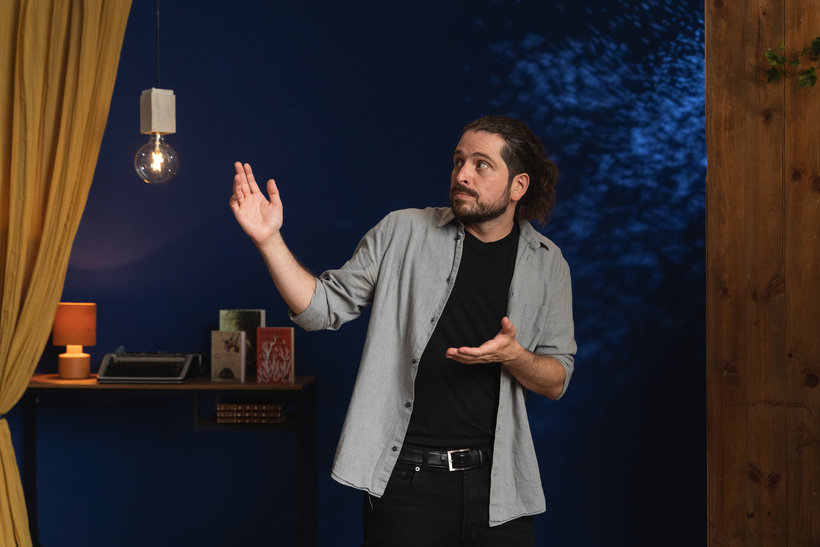Oral Storytelling for Beginners
Course final project
A course by Andrés Montero , Writer and Storyteller
About the final project for: Oral Storytelling for Beginners
Oral Storytelling for Beginners
“Thank you very much for having accompanied me on this path that we have traveled during the course. It may seem like the end of the story, but quite the opposite! It will surely be the first of many stories to come and the beginning of your story here at Domestika. Now let's review the key phases of the project. I would like you to briefly explain what you have done in each one and accompany the explanation with one or more images. I really want to hear the story you chose! Choice of story Try to keep it short (in the end you must narrate it in a maximum of 4 minutes), that it has an interesting conflict and, above all, that you want to tell it. I chose The Country Where You Never Die , by Italo Calvino. Adaptation Adapt your story to your own words, changing what you want to change without losing the original meaning of the story. Storyboard Divide a sheet of paper into four grids. In each of them, draw the four essential moments, the nuclei that you have identified. Tell the story After rehearsing as much as possible, record yourself on audio or video telling the story. You sure do great! Some recommendations to help you: • Choose a quiet and beautiful space, where you feel calm and comfortable for you. • As we have seen, you can record your story as audio or tell it to the camera. If you choose the latter, you can ask a person to record you or do it in selfie mode. In both cases, it will be important to consider that the public is on the other side of the screen, so your gaze must go towards the lens. Don't forget to watch your back: there should be no distractions behind you. Your hands should be free so you can use them to emphasize various parts of the story. • If at any time you get lost, try not to cut the recording. Imagine that you have an audience in front of you: you can't say “Sorry, I'll start over”. Try to muddle through with sympathy. If you are clear about the nuclei of your story, you will be able to pick up the thread. Don't worry if you mispronounce a word or if a sentence gets confused: orality is like that. • Listen or watch your recording and ask yourself: is it understood? Flowing? Does it entertain? Do not forget that it should not exceed four minutes. Record again if you were not completely satisfied.

Partial transcription of the video
“Final project We have reached the end of this tale. I hope it has been useful to you and, above all, that you had as good a time as I did. I really want to hear the story you chose and give you some feedback. Now you can choose if you are going to record your story on audio or on camera, but, in either case, think that you have an audience in front of whom you are telling the story. That means if you mispronounce a word or a phrase stops you halfway or you forget something, nothing happens because orality is like that. Try to improvise, keep counting until finally the story you want to tell...”
This transcript is automatically generated, so it may contain mistakes.
Course summary for: Oral Storytelling for Beginners
-
Category
Marketing & Business, Writing -
Areas
Children's Literature, Communication, Creative Writing, Fiction Writing, Narrative, Storytelling

Andrés Montero
A course by Andrés Montero
Andrés Montero is a writer and storyteller from Santiago de Chile. In 2012, he cofounded the company La Matrioska, with which he has put on performances, workshops, and lectures on oral storytelling throughout Chile and in more than ten countries across America and Europe. Every year La Matrioska hosts the International Festival of Oral Narration, ChileCuentos, and in 2022 premiered the television program Los Cuenteros.
As a writer, he has published the novels La muerte viene estilando, Taguada, and Tony Ninguno, which was awarded the Premio Iberoamericano de Novela Elena Poniatowska. He has also published children's books such as Alguien toca la puerta: Leyendas chilenas and an essay entitled Por qué contar cuentos en el siglo XXI. In general, all his projects aim to explore the relationship between literature and orality.
- 98% positive reviews (55)
- 1,758 students
- 15 lessons (2h 23m)
- 20 additional resources (5 files)
- Online and at your own pace
- Available on the app
- Audio: Spanish
- Spanish · English · Portuguese · German · French · Italian · Polish · Dutch
- Level: Beginner
- Unlimited access forever




